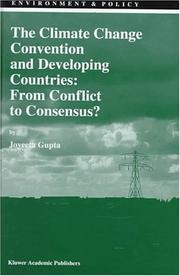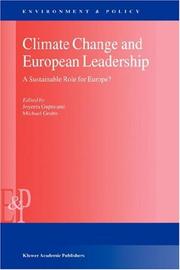| Listing 1 - 10 of 24 | << page >> |
Sort by
|

ISBN: 0792345770 9048148588 9401589259 Year: 1997 Volume: 8 Publisher: Dordrecht ; Boston ; London Kluwer Academic Publishers
Abstract | Keywords | Export | Availability | Bookmark
 Loading...
Loading...Choose an application
- Reference Manager
- EndNote
- RefWorks (Direct export to RefWorks)
The climate change problem can only be effectively dealt with if global anthropogenic greenhouse gas (GHG) emissions can be reduced substantially. Since the emission of such gases is closely related to the economic growth of countries, a critical problem to be addressed by the United Nations Framework Convention on Climate Change (FCCC) is: how will the permissible emission levels be shared between industrialised (ICs) and developing countries (DCs)? The thesis of this book is that the long-term effectiveness of the FCCC runs the risk of a horizontal negotiation deadlock between countries and the risk of vertical standstill within countries if there is little domestic support for the domestic implementation of measures being announced in international negotiations. The research question is: Can one observe trends towards horizontal deadlock and vertical standstill and if yes, how can the treaty design be improved so as to avoid such potential future bottlenecks? The research focuses on the perspectives of domestic actors on the climate convention and related issues in four developing countries: India, Indonesia, Kenya and Brazil. The following key findings emerge from the research: 1. Handicapped negotiating power: The common theme of the foreign policy of DCs is that ICs are responsible for the bulk of the GHG emissions and need to take appropriate domestic action.
Climatic changes --- Greenhouse gases --- Political aspects --- Environmental aspects --- Developing countries --- Environmental policy --- Environmental management. --- Environmental law. --- Environmental policy. --- International economics. --- Environmental Management. --- Environmental Law/Policy/Ecojustice. --- International Economics. --- Economic policy, Foreign --- Economic relations, Foreign --- Economics, International --- Foreign economic policy --- Foreign economic relations --- Interdependence of nations --- International economic policy --- International economics --- New international economic order --- Economic policy --- International relations --- Economic sanctions --- Environment and state --- Environmental control --- Environmental management --- Environmental protection --- Environmental quality --- State and environment --- Environmental auditing --- Environment law --- Law --- Sustainable development --- Environmental stewardship --- Stewardship, Environmental --- Environmental sciences --- Management --- Government policy --- Law and legislation
Book
ISBN: 1107720907 1107723183 1139629077 1107040515 Year: 2014 Publisher: Cambridge : Cambridge University Press,
Abstract | Keywords | Export | Availability | Bookmark
 Loading...
Loading...Choose an application
- Reference Manager
- EndNote
- RefWorks (Direct export to RefWorks)
What has happened globally on the climate change issue? How have countries' positions differed over time, and why? How are problems and politics developing on an increasingly globalised planet, and can we find a solution? This book explores these questions and more, explaining the key underlying issues of the conflicts between international blocs. The negotiation history is systematically presented in five phases, demonstrating the evolution of decision-making. The book discusses the coalitions, actors and potential role of the judiciary, as well as human rights issues in addressing the climate change problem. It argues for a methodical solution through global law and constitutionalism, which could provide the quantum jump needed in addressing the problem of climate governance. This fascinating and accessible account will be a key resource for policymakers and NGOs, and also for researchers and graduate students in climate policy, geopolitics, climate change, environmental policy and law, and international relations.
Climatic changes --- Changes, Climatic --- Changes in climate --- Climate change --- Climate change science --- Climate changes --- Climate variations --- Climatic change --- Climatic fluctuations --- Climatic variations --- Global climate changes --- Global climatic changes --- Climatology --- Climate change mitigation --- Teleconnections (Climatology) --- Environmental law --- Liability for climatic change damages --- Law and legislation. --- Government policy --- History. --- Environmental aspects --- Law and legislation --- Global environmental change

ISBN: 1842770799 Year: 2001 Publisher: London Zed Books
Abstract | Keywords | Export | Availability | Bookmark
 Loading...
Loading...Choose an application
- Reference Manager
- EndNote
- RefWorks (Direct export to RefWorks)
Book
ISBN: 9781107040519 9781139629072 Year: 2014 Publisher: Cambridge Cambridge University Press
Abstract | Keywords | Export | Availability | Bookmark
 Loading...
Loading...Choose an application
- Reference Manager
- EndNote
- RefWorks (Direct export to RefWorks)

ISBN: 079236466X 904815524X 940171049X Year: 2000 Publisher: Dordrecht Kluwer
Abstract | Keywords | Export | Availability | Bookmark
 Loading...
Loading...Choose an application
- Reference Manager
- EndNote
- RefWorks (Direct export to RefWorks)
The issue of climate change is now widely recognised as one of the major challenges for mankind in the 21st century, not only because it may ultimately affect many areas of our environment, nature and human activity but also because its mitigation may have far reaching consequences for almost all sectors of the economy where energy conversion takes place. Although climate change is firmly positioned on the political agenda and some initial targets have been agreed within a global framework, we are still far away from a mature political and practical policy which may deliver timely and appropriate results .to tum the tide. This is partly due to the complex nature of a possible global climate change regime, the still early stage of the development of effective and efficient instruments and the wide variety of possible ramifications for individual countries and economic sectors. But it is also due to the complexity of the negotiation process, and the lack of effective international or even global governance and leadership to tackle a multi-dimensional problem of this size and nature. This book is the first broad attempt to address the issue of leadership by one of the major parties to the UN Framework Convention on Climate Change in the ongoing international debate and negotiations towards such a policy which inevitably has to be constructed on a global scale.
Meteorology. Climatology --- Environmental protection. Environmental technology --- European Union --- Climatic changes --- Environmental policy --- Government policy --- Environmental economics. --- Environmental law. --- Environmental policy. --- Political science. --- Climate change. --- Environmental Economics. --- Environmental Law/Policy/Ecojustice. --- Political Science. --- Climate Change. --- Changes, Climatic --- Changes in climate --- Climate change --- Climate change science --- Climate changes --- Climate variations --- Climatic change --- Climatic fluctuations --- Climatic variations --- Global climate changes --- Global climatic changes --- Climatology --- Climate change mitigation --- Teleconnections (Climatology) --- Administration --- Civil government --- Commonwealth, The --- Government --- Political theory --- Political thought --- Politics --- Science, Political --- Social sciences --- State, The --- Environment and state --- Environmental control --- Environmental management --- Environmental protection --- Environmental quality --- State and environment --- Environmental auditing --- Environment law --- Law --- Sustainable development --- Economics --- Environmental aspects --- Law and legislation --- Economic aspects
Book
ISBN: 904818214X 1402098669 9786612236495 1282236490 1402098677 Year: 2009 Publisher: Doredrecht : Springer,
Abstract | Keywords | Export | Availability | Bookmark
 Loading...
Loading...Choose an application
- Reference Manager
- EndNote
- RefWorks (Direct export to RefWorks)
The Evolution of the Law and Politics of Water presents an overview of global trends in water law and policy and assesses current global water governance. It provides an historic understanding of how and why after 5,000 years of water governance, that governance still has not reached stability. It identifies the key research questions for water law and policy while providing an overview of the current global water governance regime, its evolving characteristics, and the legal theories involved in these changes. It focuses on water law and discusses the characteristics of national, supranational, and international water law through a combination of case studies and thematic chapters. The Evolution of the Law and Politics of Water is the first volume to take a global perspective on the evolution of water law and policy. It describes global patterns and sets forth the particulars of eight national legal systems drawn from every continent and five regional or supranational systems, as well as the body of customary international law as a whole. In particular, it is the first book to explore the interrelation between culture, religion, government and law in water governance and management. The volume is, therefore, a must-read for anyone interested in how water governance has changed through time and in different places as well as anyone interested in how water law has sought to channel water governance through time and in different places and what variables account for the relative success (or lack of success) of water law in performing this channelling function. It is suggestive of possible lines of water law reform and whether a particular reform is likely to be successful.
Water --Law and legislation. --- Water rights. --- Water --- Water rights --- Law, General & Comparative --- Economic History --- Environmental Sciences --- Earth & Environmental Sciences --- Business & Economics --- Law, Politics & Government --- Law and legislation --- Water-supply --- Law and legislation. --- Political aspects. --- International cooperation. --- Availability, Water --- Water availability --- Water resources --- Rights, Water --- Environment. --- Environmental management. --- Political science. --- Geography. --- Law. --- Environmental law. --- Environmental policy. --- Water pollution. --- Environmental Law/Policy/Ecojustice. --- Water Policy/Water Governance/Water Management. --- Waste Water Technology / Water Pollution Control / Water Management / Aquatic Pollution. --- Law, general. --- Political Science. --- Geography, general. --- Natural resources --- Public utilities --- Water resources development --- Water utilities --- Riparian rights --- Water trusts --- Environmental pollution. --- Cosmography --- Earth sciences --- World history --- Administration --- Civil government --- Commonwealth, The --- Government --- Political theory --- Political thought --- Politics --- Science, Political --- Social sciences --- State, The --- Acts, Legislative --- Enactments, Legislative --- Laws (Statutes) --- Legislative acts --- Legislative enactments --- Jurisprudence --- Legislation --- Chemical pollution --- Chemicals --- Contamination of environment --- Environmental pollution --- Pollution --- Contamination (Technology) --- Asbestos abatement --- Bioremediation --- Environmental engineering --- Environmental quality --- Factory and trade waste --- Hazardous waste site remediation --- Hazardous wastes --- In situ remediation --- Lead abatement --- Pollutants --- Refuse and refuse disposal --- Environment law --- Environmental control --- Environmental protection --- Environmental policy --- Law --- Sustainable development --- Environmental aspects --- Aquatic pollution --- Fresh water --- Fresh water pollution --- Freshwater pollution --- Inland water pollution --- Lake pollution --- Lakes --- Reservoirs --- River pollution --- Rivers --- Stream pollution --- Water contamination --- Water pollutants --- Water pollution --- Waste disposal in rivers, lakes, etc. --- Environmental stewardship --- Stewardship, Environmental --- Environmental sciences --- Management --- Environment and state --- Environmental management --- State and environment --- Environmental auditing --- Government policy
Multi
ISBN: 9781402098673 Year: 2009 Publisher: Dordrecht Springer Netherlands
Abstract | Keywords | Export | Availability | Bookmark
 Loading...
Loading...Choose an application
- Reference Manager
- EndNote
- RefWorks (Direct export to RefWorks)
The Evolution of the Law and Politics of Water presents an overview of global trends in water law and policy and assesses current global water governance. It provides an historic understanding of how and why after 5,000 years of water governance, that governance still has not reached stability. It identifies the key research questions for water law and policy while providing an overview of the current global water governance regime, its evolving characteristics, and the legal theories involved in these changes. It focuses on water law and discusses the characteristics of national, supranational, and international water law through a combination of case studies and thematic chapters. The Evolution of the Law and Politics of Water is the first volume to take a global perspective on the evolution of water law and policy. It describes global patterns and sets forth the particulars of eight national legal systems drawn from every continent and five regional or supranational systems, as well as the body of customary international law as a whole. In particular, it is the first book to explore the interrelation between culture, religion, government and law in water governance and management. The volume is, therefore, a must-read for anyone interested in how water governance has changed through time and in different places as well as anyone interested in how water law has sought to channel water governance through time and in different places and what variables account for the relative success (or lack of success) of water law in performing this channelling function. It is suggestive of possible lines of water law reform and whether a particular reform is likely to be successful.
Politics --- International law --- Law --- Environmental law --- Water supply. Water treatment. Water pollution --- Geography --- politieke wetenschappen --- waterverontreiniging --- recht --- internationaal recht --- geografie --- milieurecht --- milieupolitiek
Book
ISBN: 9780521197618 0521197619 9780511712067 9781107696389 1107696380 1107205298 0511846681 0511713614 9786613149619 0511712782 0511722923 0511716117 0511712065 1283149613 0511714866 9780511712784 9780511714863 6613149616 Year: 2010 Publisher: Cambridge New York Cambridge University Press
Abstract | Keywords | Export | Availability | Bookmark
 Loading...
Loading...Choose an application
- Reference Manager
- EndNote
- RefWorks (Direct export to RefWorks)
Climate change, development and development cooperation are, individually and jointly, three politically sensitive, complex issues, especially in the context of relations between developed and developing countries. This book tackles these issues by combining theoretical, political, and practical perspectives, analysing the dominant paradigms and exploring the meaning of the concept of mainstreaming. At the practical level, it presents the results of case studies focusing on assistance provided by the European Union and key member states and the climate needs articulated by developing countries. At the political level, it highlights the sensitivities between developed and developing countries and examines the mainstreaming debate in various fora. This book is valuable for policymakers, academics, politicians and non-state actors working in the fields of development studies, international law, politics, international relations, economics, climate change, and environmental studies.
Economic development --- Environmental protection --- Climatic changes --- Développement économique --- Environnement --- Climat --- Environmental aspects --- International cooperation --- Economic aspects --- Aspect de l'environnement --- Coopération internationale --- Protection --- Changements --- Aspect économique --- Economic aspects. --- Environmental aspects. --- International cooperation. --- Développement économique --- Coopération internationale --- Aspect économique --- Eco-development --- Ecodevelopment --- Environmental Sciences --- Atmospheric Science --- Climatic changes.
Book
ISBN: 1108639216 1108707688 1108770657 9781108770651 9781108639217 Year: 2019 Publisher: Cambridge : Cambridge University Press,
Abstract | Keywords | Export | Availability | Bookmark
 Loading...
Loading...Choose an application
- Reference Manager
- EndNote
- RefWorks (Direct export to RefWorks)
Published to coincide with the Fourth United Nations Environmental Assembly, the Summary for Policymakers of the sixth Global Environment Outlook provides an evidence-based source of environmental information to help policymakers in government, local authorities and businesses achieve the UN's Sustainable Development Goals. Since the first edition in 1997, there have been many examples of environmental improvement, especially where problems have been well identified, manageable, and where regulatory and technological solutions have been readily available. Nevertheless, the overall condition of the global environment has deteriorated and urgent action, involving ambitious and effective policies, is necessary to arrest and reverse this situation. This Summary for Policymakers answers key policy questions by assessing the drivers of environmental change, the scale and effectiveness of policy responses, potential pathways for achieving sustainability goals in an increasingly complex world, and the data and information that can support the decision-making process. Also available as Open Access on Cambridge Core.
Environmental policy --- Environmental protection --- Global environmental change. --- Environmental change, Global --- Global change, Environmental --- Global environmental changes --- Change --- Ecology --- International cooperation. --- Climatic changes
Book
ISBN: 9781782548003 1782548009 Year: 2016 Publisher: Cheltenham, UK ; Northampton (Mass.) : Edward Elgar Publishing,
Abstract | Keywords | Export | Availability | Bookmark
 Loading...
Loading...Choose an application
- Reference Manager
- EndNote
- RefWorks (Direct export to RefWorks)
| Listing 1 - 10 of 24 | << page >> |
Sort by
|

 Search
Search Feedback
Feedback About UniCat
About UniCat  Help
Help News
News